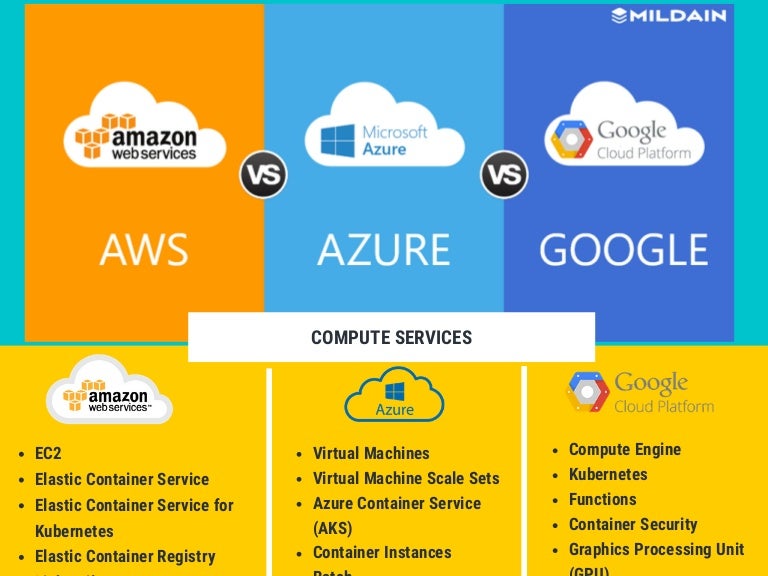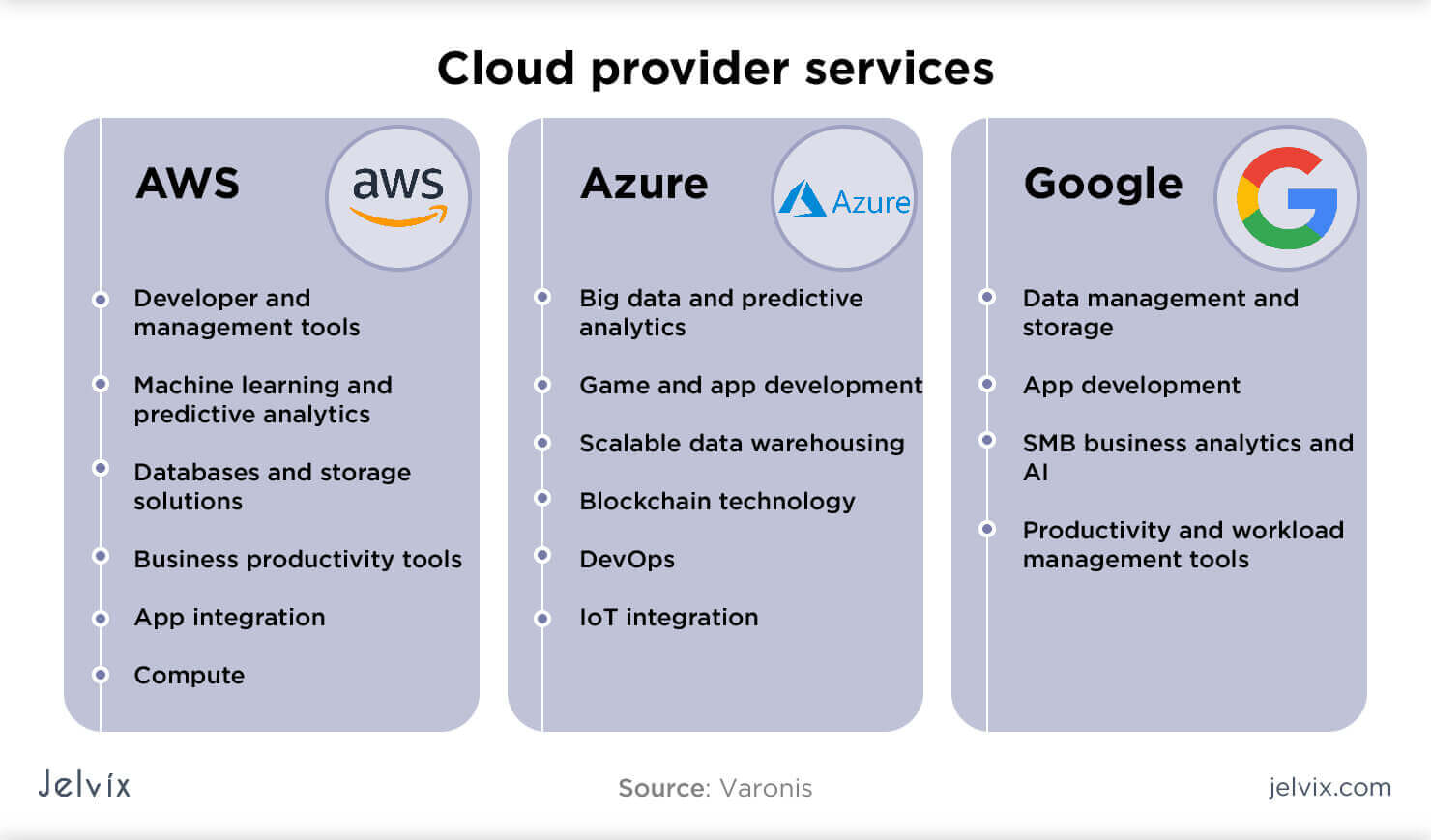Introduction: The Rise of Cloud Computing and Major Players
Cloud computing has revolutionized the way businesses operate by offering on-demand access to a shared pool of computing resources. These resources include servers, storage, databases, networking, software, analytics, and intelligence over the internet. The benefits of cloud computing are numerous, including cost savings, scalability, flexibility, high availability, and security. As a result, the demand for cloud services has been increasing rapidly, with more organizations moving their workloads to the cloud every day.
Google Cloud Platform (GCP), Microsoft Azure, and Amazon Web Services (AWS) are the three leading cloud platform providers in the market today. Each of these platforms offers a wide range of services and tools to help businesses of all sizes and industries to migrate, manage, and optimize their workloads in the cloud.
GCP (Google Cloud Platform): A Deep Dive into Features and Benefits
Google Cloud Platform (GCP) is a powerful and flexible cloud platform that offers a wide range of services and tools for businesses of all sizes and industries. GCP is known for its strong capabilities in machine learning, data analytics, and competitive pricing. Here are some of the unique features, strengths, and use cases of GCP:
- Machine Learning Capabilities: GCP offers a suite of machine learning tools and services, including AutoML, AI Platform, and Cloud ML Engine. These tools enable businesses to build, deploy, and manage machine learning models at scale, without requiring extensive expertise in data science or machine learning.
- Data Analytics Tools: GCP provides a variety of data analytics tools, such as BigQuery, Cloud Dataflow, and Cloud Dataproc. These tools enable businesses to process and analyze large volumes of data in real-time, and derive insights that can inform business decisions and strategies.
- Competitive Pricing: GCP offers competitive pricing for its services, with a flexible pricing model that allows businesses to pay only for the resources they use. GCP also offers sustained use discounts, committed use discounts, and custom pricing options for large-scale deployments.
- Use Cases: GCP is well-suited for businesses that require strong machine learning and data analytics capabilities, such as data-driven startups, e-commerce companies, and research institutions. GCP is also a popular choice for businesses that use or develop Google products, such as Gmail, Google Docs, and Google Analytics.
Overall, GCP is a powerful and flexible cloud platform that offers a wide range of services and tools for businesses of all sizes and industries. Its strong machine learning and data analytics capabilities, combined with its competitive pricing, make it a compelling choice for businesses that require these features and functionality.
Azure: Microsoft’s Cloud Platform and Its Key Offerings
Microsoft Azure is a comprehensive cloud platform that offers a wide range of services and tools for businesses of all sizes and industries. Azure is known for its hybrid cloud capabilities, strong integration with Microsoft products, and enterprise-focused features. Here are some of the unique features, strengths, and use cases of Azure:
- Hybrid Cloud Capabilities: Azure offers a range of hybrid cloud solutions that enable businesses to seamlessly integrate their on-premises infrastructure with the Azure cloud. This allows businesses to take advantage of the benefits of cloud computing, while still maintaining control over their on-premises resources.
- Strong Integration with Microsoft Products: Azure is deeply integrated with Microsoft’s suite of productivity and collaboration tools, including Office 365, Dynamics 365, and Power BI. This makes it an ideal choice for businesses that use or develop Microsoft products, as they can easily integrate their existing workflows and processes with the Azure cloud.
- Enterprise-Focused Features: Azure offers a range of enterprise-focused features, such as Azure Active Directory, Azure Security Center, and Azure Monitor. These tools enable businesses to manage their cloud resources with confidence, and ensure that their data and applications are secure and compliant with industry regulations.
- Use Cases: Azure is well-suited for businesses that require hybrid cloud capabilities, strong integration with Microsoft products, and enterprise-focused features. This includes businesses in regulated industries, such as healthcare and finance, as well as businesses that use or develop Microsoft products, such as SharePoint and Dynamics.
Overall, Azure is a powerful and flexible cloud platform that offers a wide range of services and tools for businesses of all sizes and industries. Its hybrid cloud capabilities, strong integration with Microsoft products, and enterprise-focused features make it a compelling choice for businesses that require these features and functionality.
AWS (Amazon Web Services): The Pioneer in Cloud Computing
Amazon Web Services (AWS) is the pioneer in cloud computing and the largest cloud platform provider in the world. AWS offers a vast array of services and tools for businesses of all sizes and industries, and is known for its scalability, reliability, and extensive service offerings. Here are some of the unique features, strengths, and use cases of AWS:
- Scalability and Reliability: AWS is designed to be highly scalable and reliable, with the ability to handle large volumes of traffic and data with ease. AWS offers a range of tools and services for load balancing, auto-scaling, and fault tolerance, ensuring that applications and workloads are always available and performing at their best.
- Extensive Service Offerings: AWS offers a vast array of services and tools, including computing, storage, databases, machine learning, analytics, and security. This allows businesses to build, deploy, and manage complex applications and workloads in the cloud, without requiring extensive expertise or resources.
- Market Share and Customer Base: AWS is the largest cloud platform provider in the world, with a market share of over 30%. AWS has a large and diverse customer base, including startups, enterprises, and government agencies, across a wide range of industries.
- Use Cases: AWS is well-suited for businesses that require scalability, reliability, and extensive service offerings. This includes businesses in e-commerce, media and entertainment, gaming, and other data-intensive industries, as well as businesses that require compliance with industry regulations, such as HIPAA and PCI-DSS.
Overall, AWS is a powerful and comprehensive cloud platform that offers a wide range of services and tools for businesses of all sizes and industries. Its scalability, reliability, and extensive service offerings make it a compelling choice for businesses that require these features and functionality.
How to Choose the Right Cloud Platform: A Comparative Analysis of GCP, Azure, and AWS
When it comes to choosing a cloud platform, businesses have a variety of options to consider. Three of the leading cloud platform providers are Google Cloud Platform (GCP), Microsoft Azure, and Amazon Web Services (AWS). Each of these platforms offers unique features, strengths, and use cases, making it important for businesses to carefully evaluate their options before making a decision. Here are some factors to consider when comparing GCP, Azure, and AWS:
- Cost: Cost is often a major consideration for businesses when choosing a cloud platform. GCP, Azure, and AWS all offer competitive pricing models, but the actual cost can vary depending on the specific services and resources used. Businesses should carefully evaluate their needs and usage patterns to determine which platform offers the best value for their specific situation.
- Performance: Performance is another important factor to consider when choosing a cloud platform. GCP, Azure, and AWS all offer high-performance computing resources, but the actual performance can vary depending on the specific services and configurations used. Businesses should carefully evaluate their performance requirements and test the platforms to ensure they meet their needs.
- Security: Security is a critical concern for businesses when moving to the cloud. GCP, Azure, and AWS all offer robust security features, but the actual security can vary depending on the specific services and configurations used. Businesses should carefully evaluate their security requirements and ensure that the chosen platform meets or exceeds their needs.
- Ease of Use: Ease of use is an important consideration for businesses, particularly those with limited IT resources. GCP, Azure, and AWS all offer user-friendly interfaces and documentation, but the actual ease of use can vary depending on the specific services and configurations used. Businesses should carefully evaluate their technical capabilities and choose a platform that is easy to use and manage.
Ultimately, the best cloud platform for a business depends on its specific needs and requirements. By carefully evaluating the factors outlined above, businesses can make an informed decision and choose the platform that best meets their needs. Whether it’s GCP, Azure, or AWS, each of these platforms offers a powerful and flexible cloud computing solution that can help businesses achieve their goals.
Real-World Use Cases: Success Stories from GCP, Azure, and AWS
When it comes to cloud computing, there are many success stories across various industries. Here are some examples of how businesses have leveraged GCP, Azure, and AWS to achieve their goals:
GCP Use Case: Snapchat
Snapchat, the popular social media platform, uses GCP for its machine learning and data analytics needs. By leveraging GCP’s powerful tools, Snapchat has been able to improve its user experience, provide more personalized content, and gain valuable insights into user behavior.
Azure Use Case: BMW
BMW, the luxury car manufacturer, uses Azure for its connected car services. By leveraging Azure’s hybrid cloud capabilities, BMW has been able to provide seamless connectivity between its on-premises infrastructure and the cloud, resulting in improved customer experience and increased operational efficiency.
AWS Use Case: Airbnb
Airbnb, the popular vacation rental platform, uses AWS for its compute, storage, and database needs. By leveraging AWS’s scalability and reliability, Airbnb has been able to support its rapid growth, improve its application performance, and ensure data protection and regulatory compliance.
These success stories demonstrate the power and flexibility of cloud computing, and how businesses can leverage these platforms to achieve their goals. However, it’s important to note that each use case is unique, and businesses should carefully evaluate their specific needs and requirements before choosing a cloud platform.
Addressing Security Concerns in the Cloud: How GCP, Azure, and AWS Approach Security
When it comes to cloud computing, security is a top concern for businesses. While cloud platforms offer many benefits, such as scalability, reliability, and cost savings, they also introduce new security challenges. Here’s how GCP, Azure, and AWS approach security and what businesses can do to ensure data protection and regulatory compliance:
GCP Security
GCP takes a layered approach to security, with a focus on defense in depth. This means that GCP uses multiple security controls and mechanisms to protect customer data and applications. GCP also offers a range of security features, such as identity and access management, network security, and encryption. Additionally, GCP provides tools for monitoring and logging, allowing businesses to detect and respond to security threats in real-time.
Azure Security
Azure also takes a layered approach to security, with a focus on protecting customer data and applications at every layer of the stack. Azure offers a range of security features, such as identity and access management, network security, and encryption. Azure also provides tools for monitoring and logging, allowing businesses to detect and respond to security threats in real-time. Additionally, Azure offers hybrid cloud capabilities, allowing businesses to extend their on-premises security policies and controls to the cloud.
AWS Security
AWS takes a shared responsibility approach to security, meaning that both AWS and its customers are responsible for securing customer data and applications. AWS provides a range of security features, such as identity and access management, network security, and encryption. AWS also provides tools for monitoring and logging, allowing businesses to detect and respond to security threats in real-time. Additionally, AWS offers a wide range of compliance certifications, making it easier for businesses to meet regulatory requirements.
When it comes to cloud security, businesses have a role to play as well. Here are some tips for ensuring data protection and regulatory compliance when using GCP, Azure, and AWS:
- Implement strong access controls and authentication mechanisms.
- Encrypt data at rest and in transit.
- Monitor and log activity to detect and respond to security threats.
- Regularly review and update security policies and procedures.
- Ensure compliance with relevant regulations and industry standards.
By following these best practices and leveraging the security features offered by GCP, Azure, and AWS, businesses can mitigate security risks and ensure the confidentiality, integrity, and availability of their data and applications in the cloud.
Future Trends in Cloud Computing: What to Expect from GCP, Azure, and AWS
Cloud computing has come a long way since its inception, and it continues to evolve at a rapid pace. Here are some emerging trends in cloud computing and how GCP, Azure, and AWS are adapting to these changes:
Edge Computing
Edge computing is a distributed computing paradigm that brings computation and data storage closer to the location where it’s needed, thus reducing latency and bandwidth usage. GCP, Azure, and AWS all offer edge computing services, allowing businesses to process data closer to the source and improve application performance.
Serverless Architectures
Serverless architectures allow businesses to build and run applications without having to manage servers or infrastructure. GCP, Azure, and AWS all offer serverless computing services, enabling businesses to focus on developing applications and delivering value to their customers.
Artificial Intelligence
Artificial intelligence (AI) is becoming increasingly important in cloud computing, enabling businesses to automate processes, gain insights from data, and improve customer experiences. GCP, Azure, and AWS all offer AI and machine learning services, allowing businesses to build intelligent applications and unlock new possibilities.
Sustainability
Sustainability is becoming a critical factor in cloud computing, as businesses seek to reduce their carbon footprint and operate in a more environmentally friendly way. GCP, Azure, and AWS all offer sustainable computing services, such as renewable energy credits and carbon-neutral data centers, enabling businesses to reduce their environmental impact.
As cloud computing continues to evolve, GCP, Azure, and AWS are at the forefront of these changes, offering innovative and cutting-edge services to businesses of all sizes. By staying up-to-date with these trends and leveraging the right cloud platform for their specific needs, businesses can gain a competitive edge and achieve their goals in the digital age.





